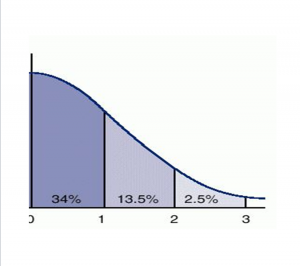This is a graph.
Let’s call it our “How People Get to Work Graph”.
Most people live under the big fat part of the graph. They are driving financed or leased cars to work. They are obligated and indebted. They are normal.
Normal Sucks. (Please remember this highly technical financial phrase; it can make you rich).
If we move just a little to the right, we find people driving their paid off cars to work. These people are not entirely normal, they are not indebted (at least not for their car) and they have given themselves a chance to win. Dave approves of these people’s transportation.
Out to the right a little further, we might find two or more people car-pooling, sharing their transportation expense. Most of you are still with me here, that’s a scenario that you can wrap your head around.
But let’s go way out under the long tail. Here we can find people who have sold their car. They don’t have a car. They don’t have car insurance or maintenance or parking or gas expenses. They don’t have finance costs or depreciation draining their net worth. They are car-free. These people are way Beyond Dave.
Could you do this? Before you answer please notice I have my fingers in my ears. Go ahead a rattle off your 52 rationalizations why this is crazy and the people who do it are nuts and why it would never work for you. Done?
The average American spends nearly 20% of the income on transportation. Twenty percent, how much is that for you?
Edmunds True Cost to Own can give you an idea what it really costs to own different models.
These people without cars plan to live without cars. They live relativity close to work. This means not only do the save on transportation costs, but they may also save on commute time as well.
What would more time at home mean to you?
Would it mean you could get a load of wash done in the morning so everyone is less rushed and stressed in the evening? Would it mean you could cook dinner more often instead of picking up unhealthy and expensive drive through food? Could you get an extra hour with the kids?
Add this value to your twenty percent.
So, how do you get to work if you don’t have a car?
Buses, trains, subways and car pools work in some places.
Electric Bikes, bikes and walking work in others.
A combination of any of the above works in even more places.
I commuted by bike 10 miles each way for a number of years. I usually rode at least 3 days a week. It was good for my health and good for the budget. It wasn’t as good as being car free but it was much better than normal.
How far can get you from normal?

very nice submit, i definitely love this web site, keep on it